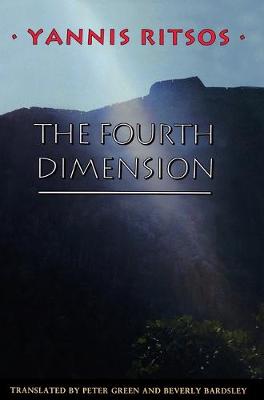Princeton Modern Greek Studies
1 total work
In Greece, more than most places, past and present, living and dead, have always coexisted: against the backdrop of that spare, harsh, beautiful limestone landscape, ideas and heroes have battled through the centuries. Homer and Makriyannis tell the same story. Those who fought for freedom against a Persian invasion share voices and profiles with the anti-Nazi guerrillas of World War II - not to mention their common habit of internecine stasis, civil war. Feuds and vendettas, the endless remembrance of ancient wrongs, run unbroken from the doomed house of Atreus to the bloody political infighting that still surfaces today. Ghosts crowd the islands; Trojans and Turks are indistinguishable. All this is the fabric of the poetry of Yannis Ritsos. In the dramatic monologues that make up "The Fourth Dimension" - especially those based on the grim history of Mycenae and its royal protagonists: Agamemnon, Clytemnestra, Orestes, Electra, Iphigenia - Ritsos presents a timeless poetic paradigm of the condition of Greece. These soliloquies (the speakers also include Ajax, Persephone, Helen and Phaedra) move effortlessly between mythic and modern realities, haunting yet immediate.
The volume also contains a group of modern narratives, including the famous and much-anthologized 'Moonlight Sonata'. Ritsos regarded "The Fourth Dimension", rightly, as his finest achievement. Much of it previously untranslated, it is now presented to English-speaking readers for the first time in its entirety: the major work that demonstrates his status as one of the greatest poets of this century.
The volume also contains a group of modern narratives, including the famous and much-anthologized 'Moonlight Sonata'. Ritsos regarded "The Fourth Dimension", rightly, as his finest achievement. Much of it previously untranslated, it is now presented to English-speaking readers for the first time in its entirety: the major work that demonstrates his status as one of the greatest poets of this century.
